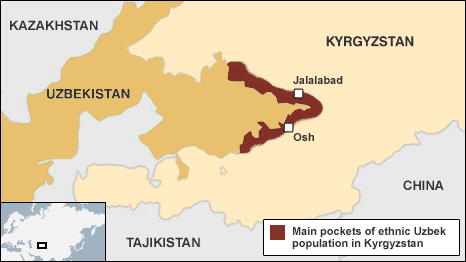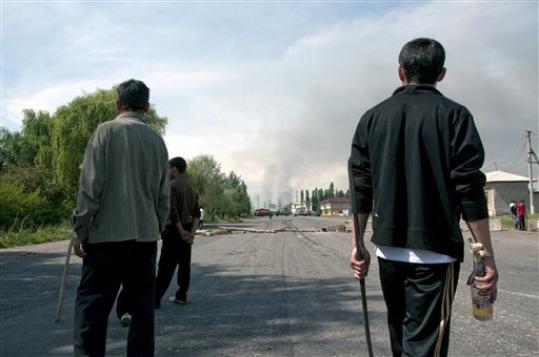 Four days of violent clashes between ethnic Kyrgyz and ethnic Uzbeks in the Osh and Jalal-Abad areas on 10-14 June 2010 left about 470 people dead, thousands injured and hundreds of thousands displaced.
Four days of violent clashes between ethnic Kyrgyz and ethnic Uzbeks in the Osh and Jalal-Abad areas on 10-14 June 2010 left about 470 people dead, thousands injured and hundreds of thousands displaced.
Ethnic bias of clashes
According to local observers, 74 per cent of those killed during clashes were Uzbek and 25 per cent Kyrgyz.
About 20 cases of rape and other sexual violence have been documented during the violence but human rights monitors believe the real number to be much higher. Many of the victims were Uzbek women and girls and the perpetrators mostly Kyrgyz men.
In the aftermath of the violence, Kyrgyzstani security forces used excessive force in their search operations and tortured or ill-treated detainees, Amnesty International’s report found.
excessive force in their search operations and tortured or ill-treated detainees, Amnesty International’s report found.
Ethnic Uzbeks accounted for 75 per cent of the casualties and sustained 90 per cent of property losses. However, according to official figures, of the 271 people who had been taken into custody in relation to the June violence, 230 were ethnic Uzbek and only 29 ethnic Kyrgyz.
Following unfair trials, during which allegations of forced confessions were not investigated, defence witnesses were not interviewed and lawyers were threatened and physically attacked, courts have handed down at least 27 life sentences, all of which to ethnic Uzbeks.
“Ethnic bias and corruption are behind the pervading impunity in Kyrgyzstan. Thousands of open cases relating to last June’s violence are waiting completion. In the meantime, hundreds, if not thousands, of officials and civilians, ethnic Kyrgyz and ethnic Uzbek, are escaping accountability for their crimes,” said Nicola Duckworth, Amnesty International’s Europe and Central Asia Programme Director.
No justice after one year
One year on from the June violence, justice is no closer to being done. The failure to investigate and prosecute abuses fairly and effectively, the widespread use of torture in the security operations that followed and the repeated official endorsement of an ethnically biased version of ev ents have compounded the sense of impunity among perpetrators and injustice among victims.
ents have compounded the sense of impunity among perpetrators and injustice among victims.
In July 2010, the Kyrgyzstani authorities mandated two independent commissions of inquiry, one with a national base, the other international.
The National Commission issued its report in January 2011. It failed to address the human rights violations committed, ignored the evidence of crimes against humanity and reiterated the official narrative of co-ordinated Uzbek aggression provoking a spontaneous response on the part of ethnic Kyrgyz.
The International Commission of Inquiry, also known as the Kyrgyzstan Inquiry Commission (KIC), published its findings in May 2011. It came to very different conclusions: serious human rights violations had taken place during and immediately after the violence.
Torture of detainees “almost universal”
There was strong evidence of widespread, systematic and coordinated offences against ethnic Uzbeks in the southern city of Osh that would amount to crimes against humanity if proved in court. The investigations and prosecutions that had taken place were flawed and ethnically biased. The report concluded that torture of detainees in connection with the violence had been “almost universal”.
The Kyrgyzstani authorities cannot afford to ignore these findings. They must be publicly endorsed and widely disseminated. The KIC’s recommendations must be implemented promptly. The international community must both push and support the Kyrgyzstani authoritie s to do this.
s to do this.
Inter-ethnic relations in Kyrgyzstan remain highly volatile and the rule of law desperately weak. The Kyrgyzstani authorities must re-establish their authority, both real and moral, in the southern regions. They must restore the confidence of all Kyrgyzstanis that they have a stake and a future in the country. None of this can be achieved without accountability for the perpetrators and justice for the victims of the June violence. The price of failure will, almost certainly, be more bloodshed.
Find the full text of the Amnesty International’s report here.
One year after clashes in Kyrgyzstan the protesters were detained. Find out more here. Find out more here about Kyrgyzstan as an ‘island of democracy’.
Related articles:
NHC Monitoring in Kyrgyzstan concerned with ongoing human rights violations
Kyrgyzstan: two killed, about twenty wounded in special operation in Osh Province
Satellite images reveal violence in Kyrgyzstan
Kyrgyzstan: International support necessary to restore order, provide humanitarian aid and democracy





